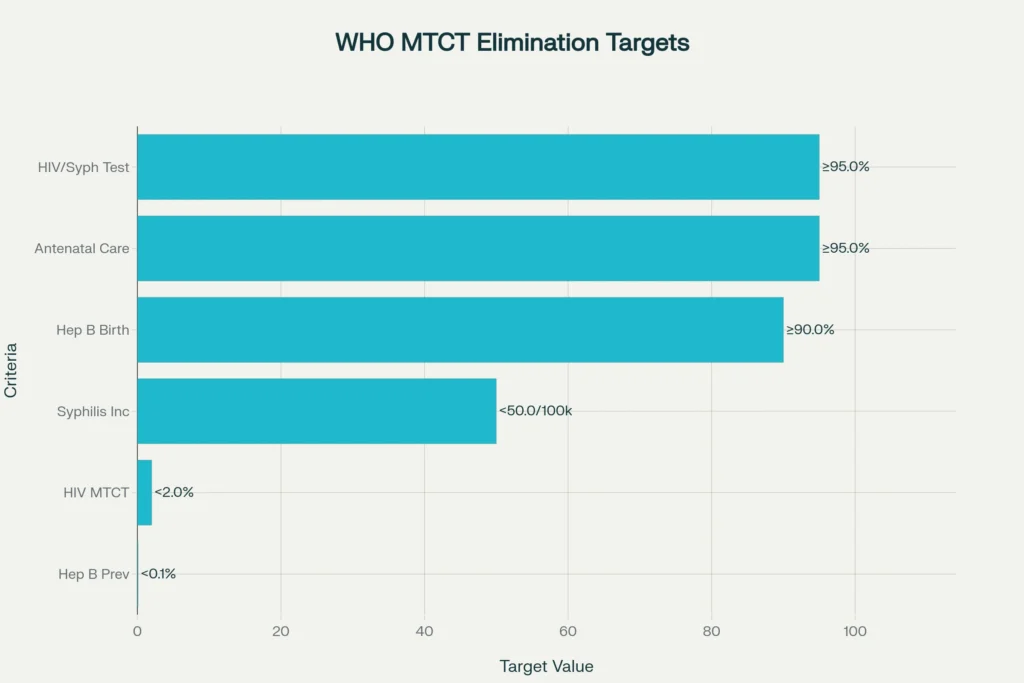Key Highlights:
- Maldives achieves world’s first Maldives triple elimination of HIV, syphilis, and hepatitis B mother-to-child transmission simultaneously
- 95% antenatal care coverage with universal disease testing ensures zero new infections in babies for HIV and syphilis since 2022
- Government investment exceeding 10% of GDP in health services supports comprehensive elimination strategy across dispersed island communities
The Republic of Maldives has secured an unprecedented position in global public health by achieving the world’s first Maldives triple elimination of mother-to-child transmission for HIV, syphilis, and hepatitis B. The World Health Organization validated this historic Maldives triple elimination milestone in October 2025, marking a transformative moment that demonstrates how comprehensive maternal health interventions can eliminate preventable disease transmission when supported by universal health coverage and sustained political commitment. This groundbreaking Maldives triple elimination achievement provides a roadmap for nations worldwide pursuing similar disease prevention goals, while addressing a critical global health challenge that affects millions of mothers and children annually.
WHO Validation Framework and Global Standards
- Triple elimination requires countries to meet specific transmission rate targets: HIV below 2%, syphilis under 50 cases per 100,000 live births, and hepatitis B prevalence under 0.1% in children aged 5
- WHO’s four-pillar implementation framework emphasizes primary prevention, sexual and reproductive health integration, essential maternal services, and comprehensive infant care
The Maldives triple elimination success aligns with WHO’s rigorous validation criteria established through the Triple Elimination Initiative launched in 2024. Countries pursuing Maldives triple elimination certification must demonstrate mother-to-child transmission rates below 2% for HIV, syphilis incidence under 50 cases per 100,000 live births, and hepatitis B surface antigen prevalence below 0.1% among children aged 5 years. WHO’s validation framework requires sustained achievement of these targets through evidence-based interventions, comprehensive data collection, and multilevel health system collaboration.
The global significance of Maldives triple elimination becomes evident when considering WHO statistics indicating that 254 million people lived with chronic hepatitis B infection globally in 2022, with 1.2 million new infections occurring annually. Without preventive interventions, mother-to-child transmission rates range from 70-90% for high-risk hepatitis B cases and 15-45% for HIV, making comprehensive prevention programs essential for breaking transmission cycles. The Maldives triple elimination model demonstrates that integrated approaches can simultaneously address multiple diseases while strengthening overall health system capacity.
WHO’s updated guidance for Maldives triple elimination emphasizes person-centered service delivery through four strategic pillars: primary prevention of infection and vertical transmission, sexual and reproductive health linkages, essential maternal elimination services, and comprehensive infant and partner care. Countries following the Maldives triple elimination pathway must implement digitalized health information systems, standardize public and private sector services, and ensure robust monitoring mechanisms for sustained elimination efforts.
#Maldives 🇲🇻 has achieved triple elimination of mother-to-child transmission of HIV, syphilis, and hepatitis B, making history by becoming the first country globally to do so.
— World Health Organization South-East Asia (@WHOSEARO) October 14, 2025
At #RC78, @DrTedros, Director-General, WHO, and Dr Catharina Boehme, Officer-in-Charge, WHO South-East… pic.twitter.com/PQNYBDPrFg
Comprehensive Health System Infrastructure
- Universal health coverage guarantees free antenatal care, vaccines, and diagnostic services for all residents including migrants
- Four-tier healthcare delivery system provides primary, secondary, and tertiary care across inhabited islands with exceptional maternal health outcomes
The Maldives triple elimination achievement stems from implementing universal health coverage that ensures more than 95% of pregnant women receive comprehensive antenatal care with nearly universal testing for HIV, syphilis, and hepatitis B. This systematic Maldives triple elimination approach resulted in zero babies born with HIV or syphilis in 2022 and 2023, while a 2023 national survey confirmed zero hepatitis B infections among first-grade school children, surpassing WHO elimination targets. The nation’s immunization system maintains exceptional performance supporting Maldives triple elimination goals, with over 95% of newborns consistently receiving timely hepatitis B birth doses and complete vaccination coverage.
Government investment exceeding 10% of GDP in health services supports the Maldives triple elimination infrastructure, significantly above the global average for small island developing states. Healthcare delivery operates through a four-tier system providing primary, secondary, and tertiary care across inhabited islands, ensuring equitable access to essential maternal and child health services that enable Maldives triple elimination success. The country achieved remarkable improvements in maternal and child health outcomes supporting Maldives triple elimination efforts, with maternal mortality dropping from 552 per 100,000 live births in 2000 to 32 per 100,000 in 2023, and child mortality reducing from 39 per 1,000 live births to 5.7 per 1,000 births over the same period.
Universal health coverage supporting Maldives triple elimination extends comprehensive services to all residents including migrants, with free antenatal care, vaccines, and diagnostic services guaranteed across the country’s dispersed island communities. This inclusive approach ensures that benefits reach vulnerable populations while maintaining high service quality standards essential for sustained disease prevention outcomes.
Today, the #Maldives became the first country in the world to achieve triple elimination of mother-to-child transmission of HIV, syphilis, and hepatitis B: https://t.co/jey5Qw4VaW
— Tedros Adhanom Ghebreyesus (@DrTedros) October 13, 2025
This is a major public health milestone that will have a lasting impact on the lives of current and… pic.twitter.com/lW9NNx3SYP
Implementation Strategy and Evidence-Based Results
- Integrated service delivery combines HIV, syphilis, and hepatitis B prevention within existing maternal health programs through multi-stakeholder coordination
- Country-led accountability with rigorous data analysis and intensive program assessment ensures sustained elimination achievements
The Maldives triple elimination strategy evolved from the country’s 2019 success in eliminating mother-to-child transmission of HIV and syphilis, expanding prevention efforts to include hepatitis B within an integrated framework. This progressive Maldives triple elimination approach demonstrates how countries can build upon existing maternal health programs to achieve comprehensive disease prevention outcomes through systematic expansion of evidence-based interventions. Essential Maldives triple elimination services include comprehensive testing in antenatal care clinics, prompt treatment for women testing positive, counseling for prevention and treatment adherence, safe delivery practices, appropriate follow-up care for exposed infants including hepatitis B vaccination, optimal feeding practices, and lifelong treatment for mothers requiring ongoing care.
The Maldives triple elimination implementation involved coordinated efforts across multiple stakeholders working on screening, service delivery, community outreach, and technical support. WHO validation criteria for Maldives triple elimination require countries to meet specific targets for reducing mother-to-child transmission rates below public health threat levels through systematic implementation of evidence-based interventions, sustained political commitment, and comprehensive health system strengthening efforts. This Maldives triple elimination achievement required country-led accountability, rigorous data analysis, intensive program assessment, and multilevel collaboration across the health system.
The success of the Maldives triple elimination integrated approach demonstrates the feasibility of addressing multiple diseases simultaneously while strengthening overall health system capacity. Countries pursuing Maldives triple elimination goals must ensure interventions are implemented consistently with human rights protection, gender equality promotion, and civil society engagement throughout the validation process.

Sustainability Framework and Global Impact
- Digital health integration and enhanced laboratory quality management support continued elimination status while advancing broader maternal health objectives
- Triple elimination model provides valuable lessons for small island developing states and countries with dispersed populations requiring equitable health service delivery
The Maldives triple elimination sustainability plan includes ongoing health system improvements through digital health information integration, expanded interventions for key populations and migrants, enhanced private sector engagement, and improved laboratory quality management. WHO continues providing technical support to ensure sustained Maldives triple elimination efforts while advancing broader maternal, child, and adolescent health objectives. Minister of Health Abdulla Nazim Ibrahim emphasized the government’s commitment to continued investment in resilient, equitable, and high-quality health services that leave no one behind, supporting long-term success.
The Maldives triple elimination achievement contributes significantly to global efforts toward achieving WHO’s 2030 elimination targets for viral hepatitis, which aim to reduce new infections by 90% and mortality by 65% compared to 2015 levels. Meeting these global targets could result in 2.85 million lives saved and prevention of 9.5 million new infections and 2.1 million cancer cases, demonstrating the broader impact potential of Maldives triple elimination strategies. The Maldives triple elimination model offers valuable lessons for countries with similar health system challenges, particularly small island developing states and nations with dispersed populations requiring equitable health service delivery across geographic barriers.
This historic Maldives triple elimination validation provides hope and practical guidance for countries worldwide working toward similar elimination goals, while contributing significantly to global efforts to reduce infectious disease burden and improve maternal and child health outcomes. The Maldives triple elimination success demonstrates that comprehensive disease prevention is achievable through integrated health system approaches, sustained political commitment, and universal health coverage implementation.
Final Perspective
The Maldives triple elimination represents more than a national health achievement; it establishes a new global standard for integrated disease prevention that other countries can adapt and implement. This milestone demonstrates how universal health coverage, combined with evidence-based interventions and strong partnerships, can eliminate preventable mother-to-child transmission of multiple diseases simultaneously. The Maldives triple elimination success provides hope and practical guidance for the global health community, proving that comprehensive maternal health interventions can effectively prevent disease transmission when supported by adequate resources and sustained political commitment. As countries worldwide pursue similar Maldives triple elimination goals, this achievement serves as both inspiration and roadmap for transforming maternal and child health outcomes globally.


